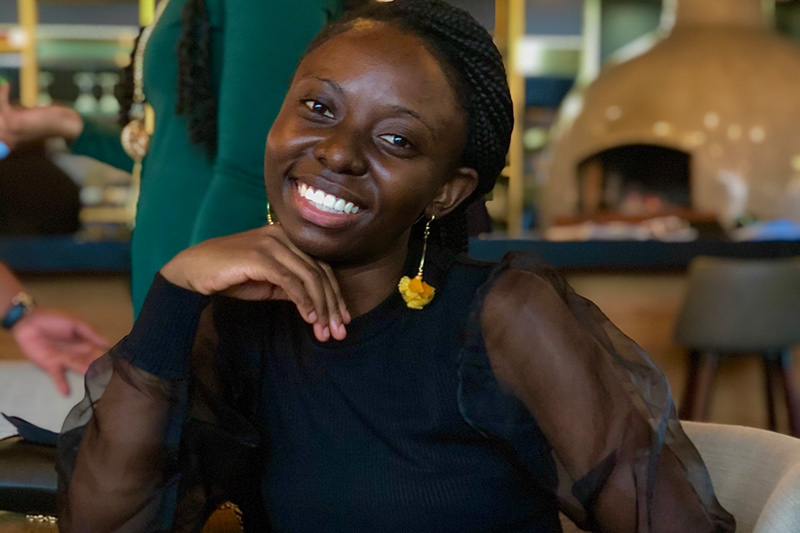Tshegofatso Masenya takes crowdfunding for students to a different level
22 October 2021 | Story Niémah Davids. Photo Supplied. Read time 6 min.
As South Africans attempt to cope with the socio-economic effects of mounting unemployment, settling college or university fees is often low on the priority list. As a result, an increasing number of higher education students are taking to social media – imploring the public to fund part of their fees to help them reach graduation day.
Tshegofatso Masenya, a fifth-year medical student at the University of Cape Town (UCT), said that more and more tweets from anxious students began appearing on her Twitter timeline. The text messages were practically identical: students need donors to fund what’s left of their college or university fees, or they won’t be allowed to graduate.
Desperate to help, Masenya got down to work. After many late nights and more coffee than her prescribed daily intake, she established GoShare – an online, donation-based crowdfunding platform that allows students to raise funds to cover their outstanding fees.
“With GoShare, our main aim is to democratise access to tertiary education.”
“With GoShare, our main aim is to democratise access to tertiary education, harness the power of community, and cultivate a culture of investing in one another,” she said.
Masenya’s unique business idea has earned her a deserved spot in the last leg of the 2021 Entrepreneurship Intervarsity competition. She is one of three UCT students who topped the regional round of the competition, and who will proceed to the final in November.
What you need to know
GoShare aims to dignify crowdfunding.
“We acknowledge that publicly asking for financial assistance is both daunting and requires that students disclose personal information about themselves and their circumstances on public platforms like Twitter and Facebook. We want to change that,” Masenya said.
While most donation-based crowdfunding is considered a once-off transaction, Masenya said, GoShare is different. The platform lists each individual student and their interests and aspirations above their financial circumstances. This means that donors get to know students on a completely different level. The platform also tracks students’ university progress, and grants donors exclusive access to their student journeys from the minute the first donation is made until graduation day.
“No amount is too little. We want donors to know that we appreciate each donation, and that each donation can make a huge impact in the lives of many students,” she said.
Masenya said students who come from combined-income households of R600 000 or less fit the platform’s eligibility criteria. This means the platform also accounts for those students who are part of the ‘missing middle’. Generally, she said, some students may gain popularity over others for various reasons, including their financial circumstances or the ingenuity of their research; but Masenya stressed that all students have equal access to funding opportunities on the GoShare platform.
The platform is open to students from South Africa’s 26 public universities, TVET colleges and other private institutions.
Spirit of giving
Financial exclusion is a heavy load to bear, and often affects students’ academic performance, their social lives and their mental health. And for those students who have managed to complete their studies but are prohibited from graduating because they were unable to settle their fees in full, Masenya said, it can delay them pursuing excellent professional opportunities. This can have a ripple effect on their careers.
“We hope that this platform will give students the space to focus on their studies and reach the highest expression of themselves without financial barriers.”
“Our platform creates a conducive environment that promotes the spirit of giving and recognises that the return on investment of an educated youth holds great promise for the economic growth and development of our country,” she said.
“We hope that this platform will give students the space to focus on their studies and reach the highest expression of themselves without financial barriers.”
But GoShare’s success depends on the generous donations of fellow South Africans.
“As a nation, we pride ourselves in the spirit of ubuntu. So it should come as no surprise that the success of any donation-based crowdfunding platform relies heavily on the willingness of people to help those around them. Our students need every rand,” she said.
Valuable vehicle for change
For Masenya, entrepreneurship is not just a crucial, empowering tool that holds the power to lift many out of poverty; it also has the potential to create a strong sense of community, and it helps to build and celebrate creativity in many different forms.
“Entrepreneurship hold tangible benefits for economic growth and is a powerful tool to drive change in South Africa.”
Thanks to entrepreneurs’ imagination and resourcefulness, they have the ability to identify gaps in society and transform these gaps into revenue-generating enterprises, while simultaneously advancing job creation.
“Entrepreneurship holds tangible benefits for economic growth and is a powerful tool to drive change in South Africa. But no one is born an entrepreneur; therefore, we have a lot to gain by supporting and mentoring youth initiatives through funding and facilitating access to the market,” Masenya said.
Email GoShare for more information.
 This work is licensed under a Creative Commons Attribution-NoDerivatives 4.0 International License.
This work is licensed under a Creative Commons Attribution-NoDerivatives 4.0 International License.
Please view the republishing articles page for more information.










